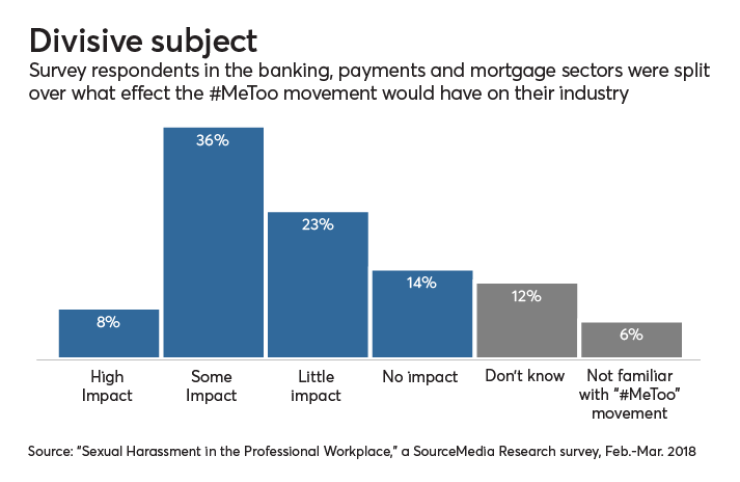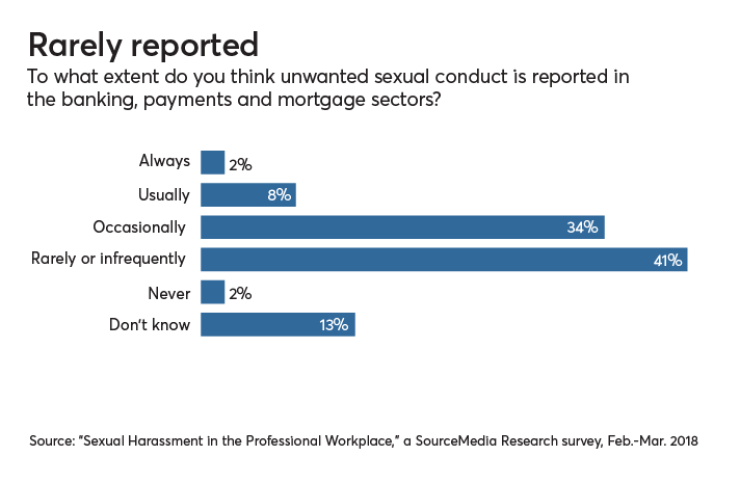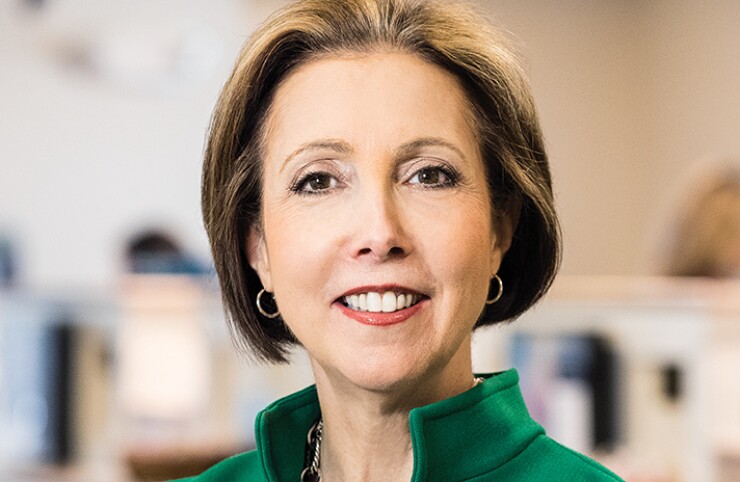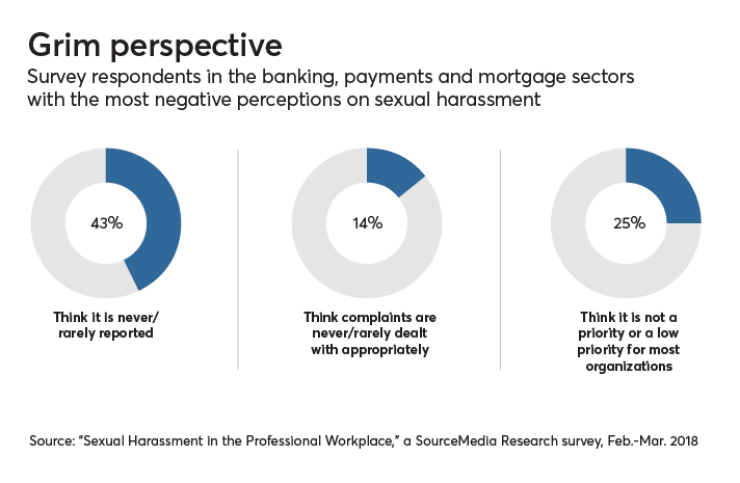The worst sexual harassment “Sarah” experienced in her investment banking career goes back to the very beginning, when she was a college intern in the late ‘80s.
Though she took the “crazy” behavior in stride — from the comments to the grabbing — she would like it if younger women did not have to. She is hopeful the current national spotlight on sexual harassment, partly driven by those using the hashtag #MeToo to share their stories on social media, will encourage more people to speak up and ultimately result in a lasting cultural change for the better.
A recent SourceMedia survey showed that a majority of men and women in the banking, payments and mortgage sectors are like Sarah in expecting the #MeToo movement to impact their industry to some degree. But not all of them expect that impact to be positive.

There were two summers when Sarah worked as an intern at an exchange in Chicago. (She asked that her real name not be used in this story.)
The excesses that defined the era — the movie “Wall Street” hit theaters in 1987 — were in full swing. Drugs and alcohol were rampant, Sarah said.
Her job was to run paper orders into the pit where the traders, almost exclusively men, would be boisterously making deals.
Any women going into the trader pit had to brace for sexually suggestive comments and some grabbing. This type of behavior was a common occurrence that went beyond
So Sarah brushed it all off, without ever complaining to anyone. “It didn’t bother me enough and I didn’t think it was that harmful,” she said.
But the behavior did bother other women, driving some female interns to quit within the first week, she said. And Sarah herself decided against pursuing a career as a trader because “the crazy frat-house atmosphere convinced me I didn’t want to work in a place like that,” she said.
Also in this series:
Now as a well-established investment banker in her 40s, Sarah would never tolerate such behavior. She would speak up, tell the harasser he was embarrassing himself and ask if he would want the women he loves treated that way.
Sarah believes the #MeToo movement will help more women feel empowered in those situations, particularly women who are not as far along in their career as she is.
“I think it will have a positive effect in making younger generations aware of what is acceptable and what is not acceptable,” she said of #MeToo. “When I was in my 20s and witnessed these things, I just thought that’s how society was, this is how the professional world is. I thought I had to put up with this.”
Men and women across the banking, payments and mortgage sectors are divided over the potential impact of the #MeToo movement, according to a recent survey about
Though many share Sarah’s hopefulness, they do not outnumber the doubters by much. More than a third — 36% — said #MeToo would have some impact on their industry, and another 8% predicted a high impact.
But 37% of survey respondents said they expect the movement to have little or no impact.
Some also suggested that a backlash is brewing, with concern about the possibility of false accusations costing women opportunities for mentorship and sponsorship from male executives.
“To avoid #MeToo becoming another hashtag, business leaders need to humble themselves,” said Erin Thomas, a partner at Paradigm, a consulting firm that focuses on diversity and inclusion. “If there is a denial of the problem, then there is no path forward to fixing it.”
Is there denial?
The survey respondents in the banking, payments and mortgage sectors consisted of roughly 70% men and 30% women — and the views expressed often showed a divide along gender lines.
Some respondents, in explaining why they don’t expect the #MeToo movement to have an impact in their industry, cited a relative lack of sexual harassment.
“There is little to no sexual harassment in my workplace,” a man in middle management wrote in his survey response. “I don’t work in Hollywood.”
Yet a majority of female survey respondents said harassment does happen. That includes the 28% of women who said they personally have been subject to some type of unwelcome sexual conduct in the workplace. Even more women — 45% — said they know of someone else who has been subject to it. And 21% said they have witnessed it happening.
The three most common offenses women cited were: inappropriate personal questions, jokes or innuendo; persistent unwelcome requests; and suggestive texts or emails. A few women also cited threats of retaliation for not complying with sexual requests.
Those who haven’t experienced sexual harassment likely underestimate the scope of the problem, said Caitlin Brown, a visiting professor at the College of William & Mary who studies social movements.
“For such a long time women have been socialized not to talk about it, and if we did talk about it, then we talked about it amongst ourselves,” Brown said.

Male survey respondents in particular were dismissive of the #MeToo movement.
“Too many crying wolf,” wrote a man in his 30s who has worked in banking for five years.
“Most of it is fake and people seeking attention who can’t perform in the workplace so they look for job protection by making false claims and thinking they have leverage in the workplace for continued employment,” wrote a man in his 60s who is in upper management.
“It promotes a victim mentality and escalates the probability that it is ok to say anything,” wrote another man in his 60s. “Puts behaving men in a category they don’t always belong in when it is a movement, vs. a case.”
A few women also expressed skepticism about #MeToo.
“Too many women mix in minor infractions with serious crimes weakening all claims of harassment. It makes people wonder if all these claims are truthful,” wrote a woman with a middle management position in the payments sector.
However, research has shown that false allegations of sexual assault are incredibly rare, experts said.
“I don’t think anyone wants to believe this is happening to the extent it is,” said Pam Jeffords, a partner at Mercer and an expert on diversity and inclusion in the workplace.
Many survey respondents cited a power imbalance in the banking industry as a contributing factor in the gender dynamics — with most of the top jobs being held by men.
“At least from one perspective what the #MeToo movement is doing is kind of questioning the allocation of power in our society,” said Randy Powell, president and founder of the Center for Applied Preventive Psychology. “People are being questioned as to why they have so much power and are essentially threatened with losing a significant part of it. Are they going to be resistant? That would be my bet.”
Possible backlash to #MeToo
A darker consequence to the #MeToo movement came through in SourceMedia’s survey and interviews, exposing a threat that could make it harder to reach gender equality in the industry.
“Corporations will discriminate against females and start hiring only male employees since it creates a less problematic environment,” wrote a woman in her 30s who works in the payments sector.
“Females will also start being excluded from situations in order for males to protect themselves,” wrote a man in his 40s who works in the mortgage sector.
Dorothy Savarese, chairman and chief executive of the $3.2 billion-asset Cape Cod Five Cents Savings Bank in Harwich, Mass., said she worries about women losing out on mentoring and sponsorship opportunities. A few men in the industry have told her they are reconsidering whether to mentor women as much as they do now.
That sentiment aligns with the findings of
“It’s important for managers and CEOs to get out in front of the discussion and say, ‘We want those mentoring and sponsor programs,’ ” Savarese said. “We need to create programs to encourage that to happen. We don’t want to discourage that at all.”

Sarah, the survey respondent who worked at the exchange in the '80s, said men at the investment bank she works for now have expressed nervousness over being accused of harassment. She finds this attitude to be perplexing and worrisome. Most of all she fears the potential influence on hiring decisions.
“If you have two candidates, and one has a risk of suing you and one doesn’t, it could go to that point,” she said.
“But, really, don’t sexually harass people,” she added. “It has been locking the door to your office while people are in there. It isn’t, ‘I like your dress today.’ ”
Her own experience applying for jobs after college might factor into her concern about hiring. One interviewer for a Chicago investment bank pointedly said he wasn’t sure she would stay at the firm because she would be the only woman. Neither of them got a chance to find out — he did not offer her the position.
To help calm the fears men might have about accidental missteps with women, companies should make their zero tolerance policies clear, said Jeffords, the Mercer consultant.
“Many companies haven’t said what they have zero tolerance for,” she said.
Positive side effects
The respondents in the SourceMedia survey who said they expect #MeToo to have a long-lasting positive impact cited an array of potential benefits: Younger employees will know that they don’t have to tolerate bad behavior. Management will be forced to act if an issue is brought to light. Executives are at least talking about the issue.
“Women will speak up more and senior executives are more sensitive to the issues,” wrote one woman in her 50s who works in middle management.
“The movement brings comfort in numbers. Victims may not feel alone or isolated,” wrote a man in his 60s with more than 25 years in banking.
Reluctance to report someone for inappropriate behavior often has to do with financial concerns, said Dan Stahl, a principal at Human Resources Group who has completed roughly 10 investigations into accusations of sexual harassment in the workplace in various industries.
In one case Stahl investigated, a woman at a small printing company in northern Wisconsin put up with seven years of harassing behavior — including lewd jokes — from a male manager because she didn’t want to risk losing her job, he said. Though he recommended firing the guy, the owner decided the manager was “indispensable,” and instead paid a settlement of $60,000 to the woman, who eventually left the job, Stahl said.
“Maybe some people in the banking industry at the lower level feel they need to stay there to earn an income,” Stahl said. “#MeToo is terrific because there are conversations that are happening now that need to occur.”

In the SourceMedia survey, 41% of respondents in the banking, payments and mortgage sectors said they think sexual harassment is rarely reported, and 2% said it never is. Another 34% said they think it is only occasionally reported.
“It has been part of the underlying problem that many women weren’t willing or weren’t free to speak up and say, ‘I don’t like this,’ ” said Phyllis Hartman, founder of PGHR Consulting, a firm that specializes in human resources, career development and employee relations. “I am a baby boomer and in my early work years, there was
With more conversations about sexual harassment happening, perhaps some management teams will take the opportunity to do deep dives into the culture of their workplaces, said Thomas, the Paradigm consultant.
Tactics like conducting surveys and measuring employee engagement offer insights about how a company can improve — beyond just this one issue.
“It doesn’t have to cost you anything other than a bit of time to ask questions to open up that forum of communication,” Thomas said. “Then it is being prepared to respond to whatever the answer is that comes back at you.”
(SourceMedia, which publishes American Banker, conducted its online survey of more than 3,000 professionals across multiple industries during the first quarter of 2018. The survey is titled “





